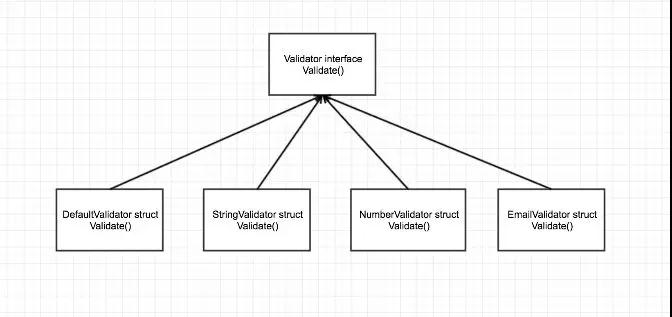Suppose we have the following structure:
type User struct {
Id int
Name string
Bio string
Email string
}· the value of Id is in a range.
· the length of Name is in the range of none.
· Email format is correct.
We might write:
user := User{
Id: 0,
Name: "superlongstring",
Bio: "",
Email: "foobar",
}
if user.Id < 1 && user.Id > 1000 {
return false
}
if len(user.Name) < 2 && len(user.Name) > 10 {
return false
}
if !validateEmail(user.Email) {
return false
}type User struct {
Id int `validate:"number,min=1,max=1000"`
Name string `validate:"string,min=2,max=10"`
Bio string `validate:"string"`
Email string `validate:"email"`
}Realization ideas

We define an interface Validator and a method Validate. Then define validators such as StringValidator, NumberValidator and EmailValidator to implement the interface Validator.
Complete instance
package main
import (
"fmt"
"reflect"
"regexp"
"strings"
)
const tagName = "validate"
//Mailbox validation regular
var mailRe = regexp.MustCompile(`\A[\w+\-.]+@[a-z\d\-]+(\.[a-z]+)*\.[a-z]+\z`)
//Verification interface
type Validator interface {
Validate(interface{}) (bool, error)
}
type DefaultValidator struct {
}
func (v DefaultValidator) Validate(val interface{}) (bool, error) {
return true, nil
}
type StringValidator struct {
Min int
Max int
}
func (v StringValidator) Validate(val interface{}) (bool, error) {
l := len(val.(string))
if l == 0 {
return false, fmt.Errorf("cannot be blank")
}
if l < v.Min {
return false, fmt.Errorf("should be at least %v chars long", v.Min)
}
if v.Max >= v.Min && l > v.Max {
return false, fmt.Errorf("should be less than %v chars long", v.Max)
}
return true, nil
}
type NumberValidator struct {
Min int
Max int
}
func (v NumberValidator) Validate(val interface{}) (bool, error) {
num := val.(int)
if num < v.Min {
return false, fmt.Errorf("should be greater than %v", v.Min)
}
if v.Max >= v.Min && num > v.Max {
return false, fmt.Errorf("should be less than %v", v.Max)
}
return true, nil
}
type EmailValidator struct {
}
func (v EmailValidator) Validate(val interface{}) (bool, error) {
if !mailRe.MatchString(val.(string)) {
return false, fmt.Errorf("is not a valid email address")
}
return true, nil
}
func getValidatorFromTag(tag string) Validator {
args := strings.Split(tag, ",")
switch args[0] {
case "number":
validator := NumberValidator{}
//Parsing min and max in structTag into structure
fmt.Sscanf(strings.Join(args[1:], ","), "min=%d,max=%d", &validator.Min, &validator.Max)
return validator
case "string":
validator := StringValidator{}
fmt.Sscanf(strings.Join(args[1:], ","), "min=%d,max=%d", &validator.Min, &validator.Max)
return validator
case "email":
return EmailValidator{}
}
return DefaultValidator{}
}
func validateStruct(s interface{}) []error {
errs := []error{}
v := reflect.ValueOf(s)
for i := 0; i < v.NumField(); i++ {
//Getting structTag by reflection
tag := v.Type().Field(i).Tag.Get(tagName)
if tag == "" || tag == "-" {
continue
}
validator := getValidatorFromTag(tag)
valid, err := validator.Validate(v.Field(i).Interface())
if !valid && err != nil {
errs = append(errs, fmt.Errorf("%s %s", v.Type().Field(i).Name, err.Error()))
}
}
return errs
}
type User struct {
Id int `validate:"number,min=1,max=1000"`
Name string `validate:"string,min=2,max=10"`
Bio string `validate:"string"`
Email string `validate:"email"`
}
func main() {
user := User{
Id: 0,
Name: "superlongstring",
Bio: "",
Email: "foobar",
}
fmt.Println("Errors:")
for i, err := range validateStruct(user) {
fmt.Printf("\t%d. %s\n", i+1, err.Error())
}
}package main
import (
"github.com/asaskevich/govalidator"
"fmt"
"strings"
)
type Server struct {
ID string `valid:"uuid,required"`
Name string `valid:"machine_id"`
HostIP string `valid:"ip"`
MacAddress string `valid:"mac,required"`
WebAddress string `valid:"url"`
AdminEmail string `valid:"email"`
}
func main() {
server := &Server{
ID: "123e4567-e89b-12d3-a456-426655440000",
Name: "IX01",
HostIP: "127.0.0.1",
MacAddress: "01:23:45:67:89:ab",
WebAddress: "www.example.com",
AdminEmail: "admin@exmaple.com",
}
//Custom tag validation function
govalidator.TagMap["machine_id"] = govalidator.Validator(func(str string) bool {
return strings.HasPrefix(str, "IX")
})
if ok, err := govalidator.ValidateStruct(server); err != nil {
panic(err)
} else {
fmt.Printf("OK: %v\n", ok)
}
}